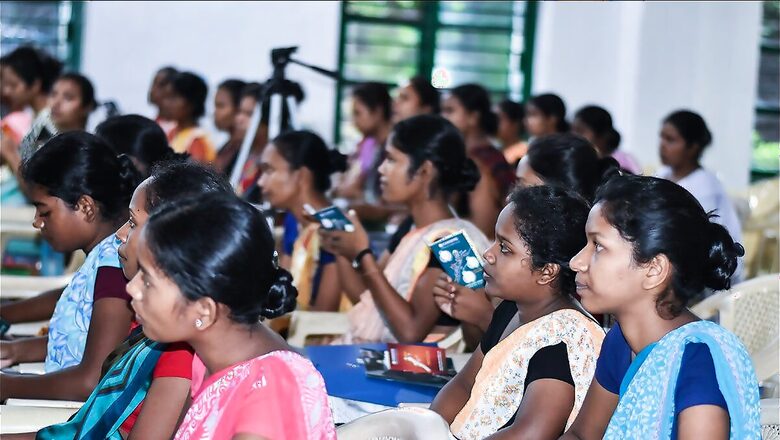
views
In the tapestry of socio-economic progress, collaboration is the weaver that brings threads of expertise, resources, and intent together to craft impactful change. Within this intricate fabric are the stories of women sanitation workers in India, who, through the power of partnerships, are experiencing transformative empowerment.
The journey towards the empowerment of women sanitation workers has been a collective effort, bringing together non-governmental organisations (NGOs), government bodies, and corporations. Mahatma Gandhi once said, “You may never know what results come of your actions, but if you do nothing, there will be no results.” This adage perfectly encapsulates the essence of partnerships in driving change. NGOs, government agencies, and corporations have recognized the urgent need to empower women sanitation workers and have joined hands to craft solutions.
Partnerships as Catalysts for Change
NGOs Leading the Way: Several NGOs have been at the forefront of empowering women sanitation workers. Organisations like Sulabh International and the Centre for Development (CFD) have been instrumental in providing training, support, and advocacy. They leverage their grassroots presence to reach women at the community level and enable them to break free from the shackles of traditional roles.
Government Initiatives: Government bodies at the local, state, and national levels play a pivotal role in policy formulation and resource allocation. Initiatives like the Swachh Bharat Mission have propelled sanitation into the limelight, resulting in increased attention and investment. Government partnerships with NGOs ensure the effective implementation of programs and policies.
Corporate Social Responsibility (CSR): Many corporations have recognized their social responsibility and have dedicated resources to uplift marginalised communities. CSR initiatives often collaborate with NGOs and government agencies to create sustainable models for women sanitation workers’ empowerment. These initiatives encompass financial support, skill development, and awareness campaigns.
As India’s leading brand in the lavatory care segment, Harpic has a deep and nuanced understanding of the challenges that women sanitation workers face. It channelled this understanding into the creation of Harpic World Toilet College (HWTC) in 2016.
HWTC was established with the stated objective of improving the quality of life of sanitation workers through their rehabilitation by linking them with dignified livelihood options. Workers trained by the college are provided placement with various organisations. Following the successful proof of concept in Rishikesh, HWTCs have opened in Maharashtra, Aurangabad, in partnership with Harpic, Jagran Pehel and Maharashtra Government.
Comprehensive Training and Skill Development
Collaborative efforts have brought about comprehensive training and skill development programs specifically tailored for women sanitation workers. The HWTC is one shining example. This innovative institution is dedicated to providing sanitation workers with the knowledge and skills they need to excel in their roles. HWTC offers practical training in various aspects of sanitation, waste management, and safety measures. Women sanitation workers acquire hands-on experience and expertise, empowering them to perform their duties more effectively.
Understanding the importance of health and hygiene is fundamental. Collaborative programs like those offered by HWTC include modules on personal hygiene, which are vital for the well-being of sanitation workers in their daily work.
Empowerment goes beyond skills; it includes financial independence. Training programs often incorporate financial literacy modules to help women sanitation workers manage their earnings and plan for their future. They may also include modules on entrepreneurship where women sanitation workers are encouraged to explore business opportunities in related fields, such as waste management and cleaning services.
Collaborative efforts between govt bodies, NGOs and grassroots organisations often facilitate access to government welfare schemes, including insurance and pension plans. This ensures that women sanitation workers have financial security in the long run.
These same partnerships are also instrumental in raising awareness and advocating for the rights and dignity of women sanitation workers. These collaborative efforts address societal attitudes and prejudices. Partners engage with communities to dispel myths and stereotypes associated with sanitation work. They help foster a sense of respect and appreciation for the invaluable services provided by women sanitation workers.
Empowerment is also about building self-confidence and dignity. HWTC’s curriculum, for instance, includes soft skills modules that help these women have the confidence to speak up when needed. Since HWTC also undertakes placements, these graduates often walk out of training with jobs in the organised sector. These are jobs where these women are paid fairly, have access to PPEs, and are set up with insurance and a provident fund account.
To say the experience is life changing is an understatement.
Sending out ripples of change
For Harpic, the work that began with HWTC took on more breadth with Mission Swachhta aur Paani. Harpic joined hands with News18 in Mission Swachhta aur Paani, a movement that champions the cause of inclusive sanitation, equality for all genders, abilities, castes and classes and the strong belief that clean toilets are a shared responsibility.
For 3 years now, Mission Swachhta aur Paani has brought together the right stakeholders on a common platform, so that issues of importance can be discussed, and solutions found. These stakeholders include govt officials, municipalities, NGOs, activists, grassroots organisations and of course, sanitation workers.
Mission Swachhta aur Paani also functions as a repository for information on a vast variety of topics surrounding toilet access, toilet hygiene, and both the work sanitation workers do, and the challenges they face. More importantly, Mission Swachhta aur Paani is bringing you stories of women sanitation workers who have beaten all odds to emerge as leaders in their communities.
India is a huge cultural melting pot, and sometimes, we don’t even know about the problems we are contributing to. This is why these stories matter, because they shine a light on our privilege, and the prejudices we are unconsciously party to.
Join us here, to learn how you can be a part of the solution that brings us closer to a just, equitable, Swachh and Swasth Bharat.



















Comments
0 comment